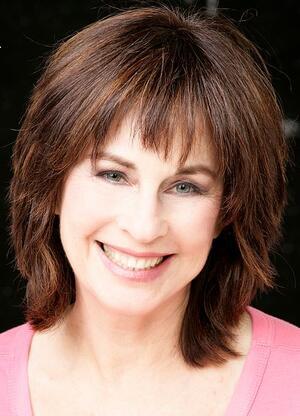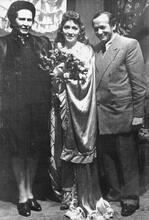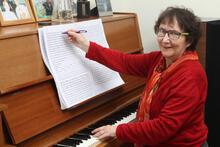Nurit Hirsch
Israeli songwriter Nurit Hirsch, date unknown.
Photo by Ilan Besor. From Wikimedia Commons
Nurit Hirsch is one of the most prolific and varied writers of contemporary Israeli songs. In 1962, after completing her army service with the Armored Corps Troupe, Hirsch worked as an accompanist at a number of places. In 1965 her first two compositions, both to lyrics by Uri Assaf, were published: “Perah ha-Lilakh” and “Kehulah ka-Halom.” Hirsch was the first Israeli composer to participate in the Eurovision Song Contest, winning fourth place in 1973. Her songs are widely sung on the radio, on television, and at singing clubs. She composed the music for fourteen films, ote wnumerous children’s songs, and won third place at the first festival of Hassidic music. Today Hirsch's repertoire contains around 1,600 songs, illustrating her enormous contribution to Hebrew music.
Family and Musical Training
Nurit Hirsch (Rosenfeld) is one of the most prolific and varied writers of contemporary Israeli song. Born in Tel Aviv on August 13, 1942, to Hillel and Leah Hirsch, she graduated from the Rubin Academy of Music, where she studied piano with Alexander Buch, composition with Mordechai Seter and Yeheskiel Braun (both Israel Prize laureates), and jazz with Professor Zvi Keren. She also studied orchestration with Noam Sharif and conducting with Laslo Roth. She continued her studies at UCLA, where she took courses in music for films, contemporary music, and electronic music. In New York she studied composition with Norman Dello Joio.
A Prolific Songwriter
In 1962, after completing her army service with the Armored Corps Troupe, Hirsch worked as an accompanist at a number of places. In 1965 her first two compositions, both to lyrics by Uri Assaf, were published: “Perah ha-Lilakh” (The Lilac Flower), performed by the Sarid Trio, and “Kehulah ka-Halom” (Blue as a Dream), performed by the Gesher ha-Yarkon Trio. “Perah ha-Lilakh” became a hit the next year, when it was performed by Chava Alberstein, who recorded it together with another of Hirsch’s songs, “Makhela Aliza” (The Happy Choir, lyrics by Leah Naor).
Over approximately the next forty years, artists have recorded twelve hundred songs by Hirsch, some in several versions. Some examples are “Ba-Shanah ha-Ba’ah” (Next year, lyrics by Ehud Manor) and “Oseh Shalom bi-Meromav” (text from the Kaddish prayer). To date, six volumes of Hirsch’s songs have appeared: Fifty Hits (Ma’ariv 1969), La-Lekhet Shevi Aharayikh (Captivated by You, Yediot Aharonot, 1984), Rak Beinatayim (Just for Now, Yediot Aharonot 1990), Dig Dig Doog (Maarive, 1996), Sharim Moreshet (Singing Heritage, Ministry of Education, Pedagogical Secretariat, 2005), and Mak'hela Aliza (Yediot Sfarim, 2007).
Today Hirsch's repertoire contains around 1,600 songs, illustrating her enormous contribution to Hebrew song. Her songs are played and sung on the radio and television and at singing clubs. They are performed by many singers and songwriters, appear at various festivals, and are tremendously popular. Hirsch has worked with Israel’s best lyricists, collaborating frequently with some, including the late Ehud Manor, Yoram Teharlev, Leah Naor, and Rahel Shapira.
A Diversified Oeuvre
Hirsch’s music is fairly diversified. In addition to the songs and popular works she has composed for some of the finest vocalists, for both military and civilian troupes, and for various vocal combinations—duos, trios, and quartets—and in addition to her many musical arrangements, she composed the music for fourteen films, including Ha-Shoter Azulay (The Policeman Azulay, which won the Golden Globe Award for Best Foreign Film in 1972; her song “Ballad for the Policeman Azoulay” was awarded “the best song of all time in the Israeli film category” by the Israeli Film Academy), Immi ha-Generalit (My Mother, the General), and Lupo. She also composed a number of musicals, such as Sallah Shabbati (which ran for four hundred performances), music for television series that became popular hits countrywide (Parpar Nehmad [Pretty Butterfly], Krovim Krovim [Relatives, Relatives], Ha-Bayit shel Fistuk [Fistuk’s House], Barba’abba, and others).
In 1992 Hirsch began composing numerous children’s songs. Together with lyricist Mikhal Hazon, she produced a video entitled Dig Dig Doog, which sold in hundreds of thousands of copies. This success led to a second video for children, Pim Pam Po (1999), which contained songs based on fairy tales, with actor Tuvya Zafir performing.
Honors and Prizes
At the first festival of Hassidic music, held in 1969, “Oseh Shalom bi-Meromav” won third prize. Since then, the tune has spread worldwide and numerous congregations of all streams of Judaism include it in their prayers.
In 1973, Israel participated for the first time in the Eurovision Song Contest, submitting Hirsch’s “Ey Sham” (Somewhere, lyrics by Ehud Manor). Not only was Hirsch the first Israeli composer and adapter to participate in the content, but Hirsch herself conducted the Eurovision orchestra in her own orchestral arrangement of the song, the first woman to do so. The song placed fourth.
At the 1978 Eurovision contest, her song “Abanibi” (lyrics by Ehud Manor, sung by Yizhar Cohen and Alphabeta) won first prize.
In Israel Radio song competitions her compositions have frequently won first prize (e.g. “Ba-Derekh Hazara” [1969, lyrics by Ehud Manor]; “The Love of Theresa di Mon” [1970, lyrics by Lea Goldberg], “Zion, Ha-Lo Tishali” [1972, lyrics by Judah Halevi], etc.). She also won first prize at children’s song contests and at a number of song festivals: in Japan (1974), Chile, Portugal (1978), France (1971), Malta (1972), Ireland (1979), Yugoslavia (1979), and Brazil. In Israeli song clubs, her works head the list of popular songs.
Among Hirsch’s other numerous awards and honors are:
- Israel Prize, 2016
- Honorary Doctorate from Bar Ilan University, 2016
- Honorary Doctorate from Ben Gurion University, 2016
- Lifetime achievement award from ACUM (the Israeli equivalent of ASCAP), 2001
- Lifetime achievement award from IUPA (Israeli Union of Performing Arts)
- Lifetime contributions to the music of Israel and the people around the world from the Zamir Choral Foundation, 2018
- The Kinor David prize for outstanding achievement in the arts, 1969
- The ACUM award in the Children's Songs category.
- Woman of the Year award from the Lions Club Organization, 2006
- Honorary Citizen on the city of Tel Aviv
- B'nai Brith World Center citation, 2014
Hirsch has two children with her ex-husband, Yoram Rosenfeld. Both are musicians: her son Danny is an instrumentalist, while her daughter Ruthi is a singer of classical music.







